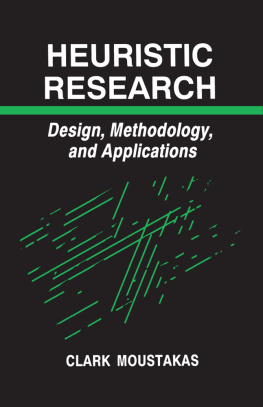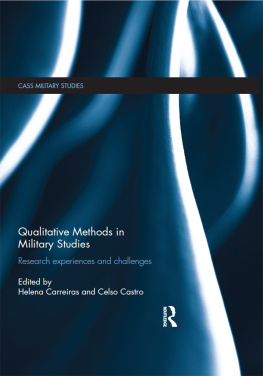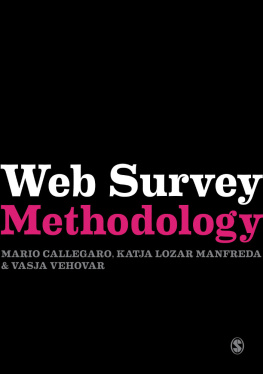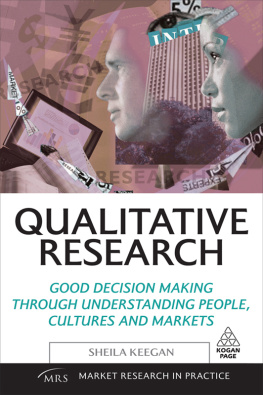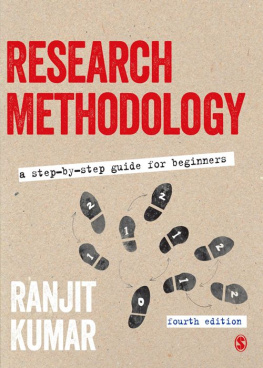Copyright 1990 by Sage Publications, Inc.
All rights reserved. No part of this book may be reproduced or utilized in any form or by any means, electronic or mechanical, including photocopying, recording, or by any information storage and retrieval system, without permission in writing from the publisher.
For information address:
 | SAGE Publications, Inc. 2455 Teller Road Newbury Park, California 91320 E-mail: SAGE Publications Ltd. 6 Bonhill Street London EC2A4PU United Kingdom SAGE Publications India Pvt. Ltd. M-32 Market Greater Kailash I New Delhi 110 048 India |
Printed in the United States of America
Library of Congress Cataloging-in-Publication Data
Moustakas, Clark E.
Heuristic research : design, methodology, and applications / by Clark Moustakas.
p. cm.
Includes bibliographical references.
ISBN 978-0-8039-3881-6ISBN 978-0-8039-3882-3 (pbk.)
1. Heuristic. 2. Problem solvingPsychological aspects.
I. Title.
BD260.M68 1990
001.42dc20 90-34596
13 14 15 16 21 20 19 18 17
Sage Production Editor: Diane S. Foster
Acknowledgments
Many people contributed to the development of Heuristic Research, first and foremost the doctoral students who studied with me at the Merrill-Palmer Institute and Saybrook Institute following publication of my loneliness studies beginning in 1961, and since 1980 at the Center for Humanistic Studies and Union Institute. Although in this book I have directly utilized the work of only recent doctoral graduates, every year since 1961 I have made elaborations and refinements in theory, concepts, processes, methods, and applications of heuristic research, often inspired by student questions and investigations. The examples and references that appear in Heuristic Research represent applications of heuristic design and methodology to research and to psychotherapy.
I express my appreciation to the following persons for the borrowed excerpts from dissertations and unpublished papers that have been incorporated in various sections of Heuristic Research: Gayle Beck, Diane Blau, Valorie Cheyne, Jon Clark, Rick Copen, Erik Craig, Stephanie Hawka, Marion MacIntyre, Louise Malefyte, Colleen McNally, Ron Marshall, Mena Potts, Claude Prefontaine, Alfonso Rodriguez, Patricia Rourke, Dorothy Schultz, Robert Shaw, Joan Snyder, Robert Snyder, John Varani, and Lynn Vaughn. I also have derived clarifications of heuristic theory and methodology from my work with Bruce Douglass whom I acknowledge and thank.
I recognize, too, the many theorists, research investigators, and psychotherapists who contributed to my knowledge and understanding of root and poetic meanings in heuristic discovery and who are often cited and quoted in this book. This group includes Carl Rogers, whose theories and conceptual papers have encouraged, supported, and often guided my thinking; Abraham Maslow, whose investigations of self-actualizing people launched an entirely new realm of scientific study of human experience; Paul Bridgman, who emphasized personal and subjective knowledge as essential components of objectivity; Martin Buber and Sydney Jourard, who presented important conceptual refinements of heuristics in concepts of I-Thou, mutuality, mystery, and self-disclosure; and Michael Polanyi, whose philosophy and scientific journeys gave heuristic ideology added significance in concepts of tacit dimension, indwelling, and intuition, as well as particular understanding of validity in qualitative investigations.
Willard Frick contributed important understandings of the symbolic growth experience and its relationship to corrective and enhancing functions of identity and selfhood. Michael Patton elucidated the nature and significance of qualitative methodologyconceptually and in practical applications. Eugene Gendlin developed focusing processes and methods that I have utilized both in research and in psychotherapy to identify and explicate central feelings and core meanings in significant human experiences. Richard van Dusen, Maureen OHara, Phillip Barrineau, and Jerold Bozarth contributed to my knowledge of the important ties in theory, value, and methodology between person-centered therapy, the internal frame of reference, and heuristic inquiry.
I also thank the individuals who reviewed and assessed the manuscript and offered suggestions for elaboration, clarification, and illustration that were utilized in finalizing Heuristic Research. This group includes Mike Arons, Eric Craig, Willard Frick, Kevin MacNeil, and Michael Patton. The inspiration, and in many ways provocation, for developing Heuristic Research came from Michael Patton. Deepening of philosophic thought and distinctions between phenomenology and heuristics were provided by Mike Arons. Erik Craig was helpful in his detailed work on the manuscript and in his concrete suggestions for enhancing its organization and clarity.
From the beginning of my studies of the individual, the writings of Soren Kierkegaard, Edmund Husserl, and Gordon Allport have extended and encouraged my understanding and involvement in heuristic theory and methodology.
I express my gratitude to Vange Puszcz and Helen Saxton, who not only typed the manuscript several times but lived through it with me. I also thank Betty Moustakas, who helped create a loving and peaceful setting in which the work could establish its roots and grow. Finally, I recognize the Center for Humanistic Studies and The Union Institute which provide resources, opportunities, and support for investigations of human science research that utilizes heuristic processes and discoveries, and encouragement that has enabled subjective and objective fantasies and realities to unite and find necessary and essential value in science, psychotherapy, and everyday human experience.
Clark Moustakas
1
Introduction: Resources and Inspirations
Heuristic research came into my life when I was searching for a word that would meaningfully encompass the processes that I believed to be essential in investigations of human experience. The root meaning of heuristic comes from the Greek word heuriskein, meaning to discover or to find. It refers to a process of internal search through which one discovers the nature and meaning of experience and develops methods and procedures for further investigation and analysis. The self of the researcher is present throughout the process and, while understanding the phenomenon with increasing depth, the researcher also experiences growing self-awareness and self-knowledge. Heuristic processes incorporate creative self-processes and self-discoveries.
The cousin word of heuristics is eureka, exemplified by the Greek mathematician Archimedes discovery of a principle of buoyancy. While taking a bath, he experienced a sudden, striking realizationthe aha phenomenonand ran naked through the streets shouting eureka! The process of discovery leads investigators to new images and meanings regarding human phenomena, but also to realizations relevant to their own experiences and lives.

